I know you strive to practice different techniques that will bring you better health. Yet, very few of us follow the natural rhythms of the day since electricity transformed our lives. Our ancestors lived their lives in tune with nature. They woke up with the sun, and went to bed when it got dark. According to Ayurveda, the more you sync with the Ayurvedic clock, the better you will feel.
Most people have heard of a biological clock, but what is the Ayurvedic clock?
Here we'll answer the question what is the Ayurvedic clock and share why it works, and how you can use it for optimal health and wellness in your life.
What is the Ayurvedic Clock?
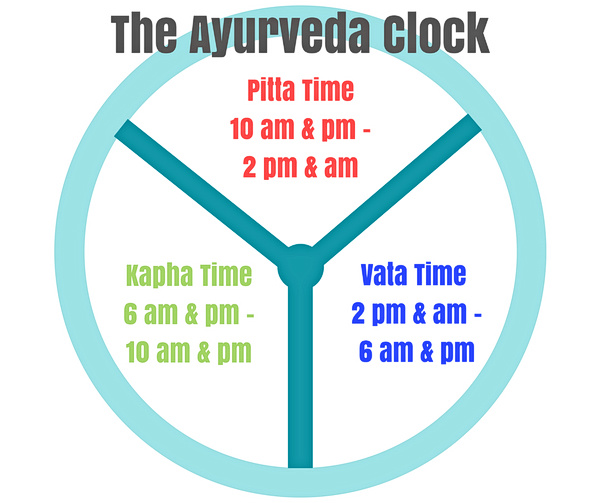
Approximate Times
First Phase – Daytime
6 am to 10 am – Kapha
10 am to 2 pm – Pitta
2 pm to 6 pm – Vata
Second Phase – Nighttime
6 pm to 10 pm – Kapha
10 pm to 2 am – Pitta
2 am to 6 am – Vata
So let's take a journey through the 24 hours of the day beginning with the sunrise.
Starting the Day
6 am – 10 am
Kapha Time
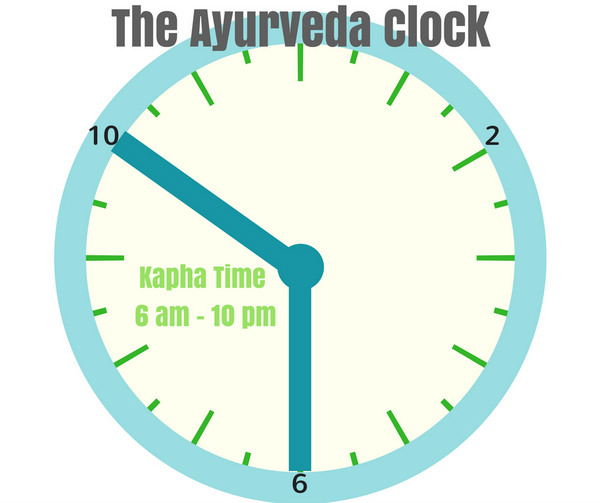
The Ayurvedic clock begins at 6 am in the Kapha period. Kapha energy is weighty, slow, heavy, relaxed and calm.
This sort of energy can make you want to hit the snooze button for just a few more minutes of sleep. But to support your body's natural rhythms and feel energetic, enthusiastic and alert, you need to wake up and get up before 6 am.
If you ignore nature's wisdom, you will fall under Kapha’s earth and water-like spell which will cause more harm than good. If you don't wake up and get out of bed, you will feel the negative weight of Kapha fog your mind and body.
You wouldn't think that fifteen to thirty more minutes of sleep could cause an adverse effect on how you start your day… But it truly does. If you want to summon a level of invigorating energy, it is in your best interest to get up with the birds between 5:30 and 6 AM.
This will help you start the day with the rhythm of nature’s natural light from the Earth, giving clearness to the mind. It will also help you if you meditate because having a clear mind is essential to getting the full benefits of Yoga and meditation. By getting up this early, you will gear up your mind and body to function at its best in your day to day routine. Yogi's call the one and a half hours before sunrise Brahmamuhurtha.
Also, this is the time of day when you will have the most strength and stamina – and so it's the ideal time to exercise.
If you suffer from sinusitis, asthma or excessive buildup of mucus in your nose and throat you may experience symptoms during this time of day.
The Middle of the Day
10 am – 2 pm
Pitta Time
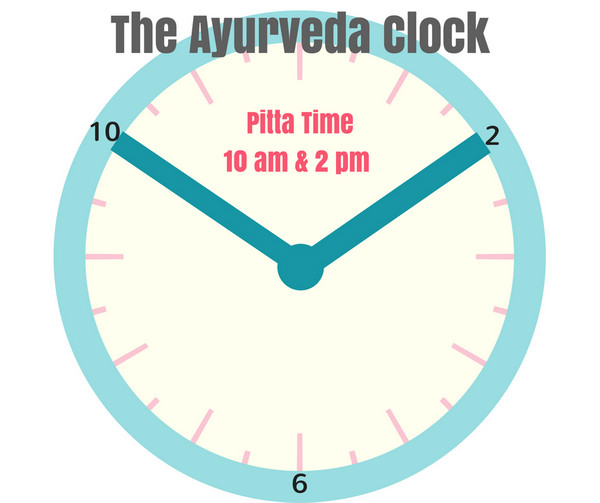
According to the ayurvedic clock, the middle of the day begins at 10 AM and ends at 2 PM. This time of day belongs to the energy of Pitta Dosha.
Pitta is the dosha that governs your metabolism, especially the digestion and the absorption of nutrients from food. Pitta energy is hot and fiery and the dominant force of good digestion. This is why it is ideal to eat your main meal at midday.
The metabolic process of your digestion, known as Agni works best during this time. Agni, your internal fire, is associated with the sun. Just as the sun is highest and hottest in the sky at mid-day, so too is your internal fire. As the sun goes down so too does your digestive fire, so aim to eat 75% of your food before the sun sets each day.
Late Afternoon
2 pm – 6 pm
Vata Time
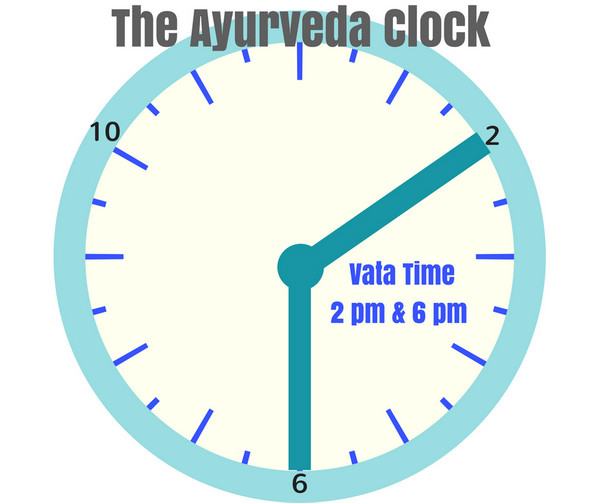
The Second Cycle of The Ayurvedic Clock
Evening
6 pm – 10- pm
Kapha Time
As we move into the evening, Kapha energy returns, and this time its heavy earth and water qualities help us to wind down and prepare us for sleep. That the very same heavy Kapha energy which makes it difficult to wake up in the morning will now help you to sleep in the evening.
Isn't it ironic that at the 6 pm marking of the day, most people are just getting off work, only to have to come home to chores and dinner?
Because of the heavy qualities accumulating now, Ayurveda recommends taking a light supper. It is better for your health if your body has finished the digestion process before sleep. Why?
Well, keep in mind that when you eat a light supper, it's easier to transition from being awake into a deeply restful state.
Let me ask you this question. How do you think your mind and body will react to you eating a hefty meal right before bedtime? Wouldn’t you think that would make your body feel bogged down, especially in the mental state? Of course, it would! Now, just think if you were only eating boxed dinners and a lot of sweets before bedtime.
For many people winding down at the end of the day involves some type of sugary snack, an alcoholic beverage, and TV. That's how we've been programmed to see relaxation time.
The hours between 6 pm and 10 pm is best for light conversation, non-violent tv shows, a warm bath, or soothing music. This will allow you to tap into the energy that helps your body to rest peacefully.
Late Evening
10 pm – 2 am
Pitta Time
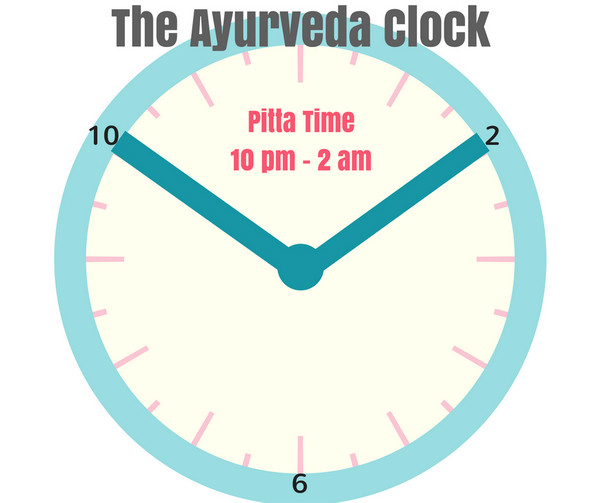
Between 10 pm – 2 am Pitta energy returns. Pitta rules activity and takes over from the drowsy Kapha level. Pitta's active digesting energy can give you a second wind that can cause you to eat or process various forms of stress from the day. If you miss the heavy energy of Kapha (between 6 pm – 10 pm), it can keep you up for the rest of the night.
What will this do you your body for the next day? By ignoring your natural drowsiness, you are sacrificing your potency for the next day. When you don't listen to your body and miss your bedtime of 10 pm, you are sacrificing your well-being.
What many people fail to understand about staying up too late is that this is the time of day that your liver does the internal cleansing.
Your liver is the housecleaner of the body. But, if you're still up and awake during this time, you miss the cleaning. To make matters worse, Pitta's fire can make you hungry, and you may find yourself wanting to eat something instead. But, your body wants to sleep now, not eat!
Early Morning
2 am – 6 am
Vata Time
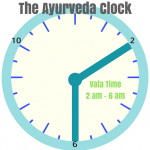
New Routines Requires You To Change
The key factor to remember is that new routines always require you to alter how you're existing now. That’s the key to anything in life, really. If you want different results, you'll need to make new and fresh changes. There isn’t much in life that’s impossible for success if you alter your current routines with determination. We are the way we are because of our daily routines.
An Ayurvedic Bedtime Routine
Turn Off the TV
Resist the Online World
Once again, the blue lights on a computer are bad for your mental health when trying to go to sleep. It would be better to turn your computer off with the television at least one hour before bedtime. The constant jumping from one page to the other will cause stress on your emotions and brain. This is bad because your mind cannot keep up when your physical body is trying to wind down for sleep.
Get a Foot Massage
Relaxation CD's
If you feel like you want to have something to listen to before bed, do Yoga Nidra, listen to a guided meditation or relaxing music. Yoga Nidra allows you to experience yourself beyond the confines of your body as witnessing awareness while your body experiences profound relaxation and restoration. It also influences brain and immune function and helps to soothe aches and pains as well as chase the worries away.
Warm Milk with Herbs
About fifteen to twenty minutes before bed, make yourself a cup of warm milk. You can add some sleep encouraging herbs for an extra dose of relaxation. I recommend cinnamon, nutmeg, cardamom, saffron, with a pinch of ghee. Let it simmer in a pot for two or three minutes. The warmth and added flavors will help you wind down as your Ayurvedic clock begins to kick in for sleep.
Conclusion of What is the Ayurvedic Clock
Ayurveda Lifestyle Products







Probably one of the best sites I’ve seen so far I can tell a lot of work went into making it. I honestly see nothing wrong with it you have a good thing going with this one. I’m not just saying that, I was tempted to go through the entire website even though it wasn’t even my cup of tea.
Hi Jasper! Thanks for taking the time to comment. I really appreciate your feedback. 😉
Very interesting! I actually find this to be true. When I’ve had sleep problems I’ve noticed is between 2 and 3 in the morning. Do you feel people who work at night have health issues? Also we shouldn’t eat after 6pm? I have always hard that that helps you lose weight. Very good article.
Hi Jim, Yes, working at through the night definitely compromises one’s health. Some of the symptoms are dry or dull skin, headache, hair fall, short temper, irritation, lack of concentration. There are things you can do to mitigate these symptoms like taking a teaspoon of ghee before going off to work the night shift, but in the long term, it puts a significant strain on the nervous system because your body is going against the grain of nature’s rhythm. I also recommend taking an adaptogen like Ashwagandha which helps to support the nervous system.